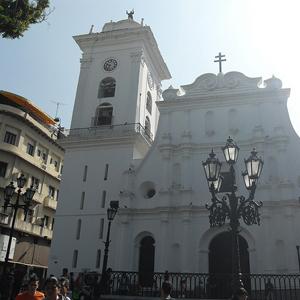Hugo Chavez and the Vatican
Caracas Cathedral (Photo: Valentina Ruiz Leotaud/Flickr)
The election of the first Latin American Pope sparked celebrations across the region, which is home to 40 percent of the world’s Catholics. But many Latin American governments now lean to the left.
And they’ve clashed with Church officials over their rejection of gay marriage, abortion, and liberation theology. Their No. 1 critic was Venezuela’s Hugo Chavez, who died last week of cancer.
Chavez was a practicing Catholic who promoted liberation theology, which holds that priests should help the poor by working for political and social change. Chavez had no stomach for the conservative Catholic hierarchy in Rome or in Caracas.
He viewed Venezuela’s Catholic Church as an influential power base that opposed his socialist revolution, and he ridiculed leading Catholic officials, calling them “liars,” “ignorant perverts,” and “Neanderthals.”
In 2010, Chavez called Venezuelan Cardinal Jorge Urosa a troglodyte for opposing Communism.
Catholic leaders struck back. One said that instead of a blessing Chavez deserved an exorcism. According to diplomatic cables released by Wikileaks, the Vatican told the US government that it wanted to undermine Chavez because it was losing influence in Venezuela.
Not surprisingly, Venezuelan state TV has all but ignored the new pope and continues to focus on Chavez’s death and legacy.
When officials refer to Bergoglio, it’s often about his close ties to Argentina’s military dictatorship in the 1970s and ’80s. On his Twitter account, one former Chavez official posted a photo of Bergoglio giving communion to imprisoned former dictator Jorge Videla.
But on the streets of Caracas, it’s easy to find people excited over the new ‘papa’. Wilmer de los Rios, who works as a hotel security guard, says he was completely surprised.
“My girlfriend called me and said: ‘Hey we have a papa from Argentina.’ I say: ‘Wow, okay, it’s good. I like it.'”
He adds that many Venezuelans disagreed with Chavez about the Church.
“I think that they were very upset about it because we never had a government who was against the Church, which is what Hugo Chavez used to be.”
Still, others could care less about the new Pope. At a Caracas church, I met Xiomara Moya, who was praying before going to work. She’s outraged about the church sex abuse scandals and says past popes did nothing to stop them. She praises Chavez for taking church officials down a notch.
In life, Chavez likely would have scoffed at the new Pope Francisco. But Wednesday interim President Nicolas Maduro suggested that, from the great beyond, Chavez helped get him elected.
“We know that our commander reached those heights,” said Maduro, “and he’s face to face with Christ. Something had an influence on the choosing of a South American pope.”
